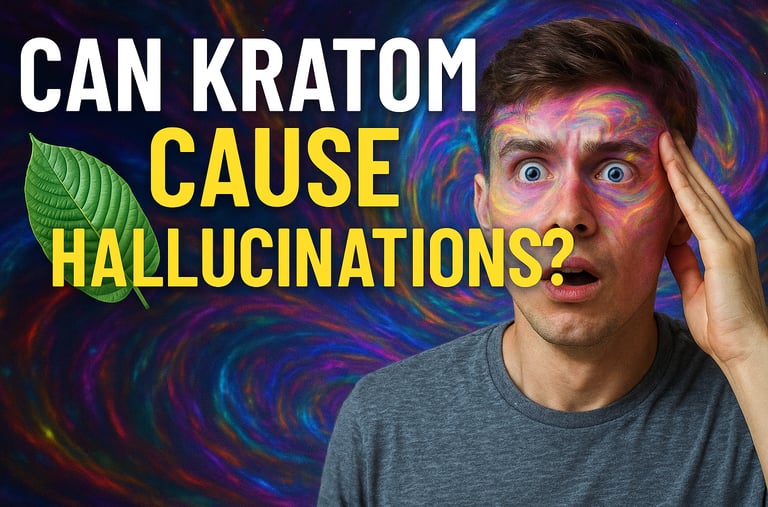High quality - Fast Delivery - Easy payment
Can Kratom Cause Hallucinations?
Kratom is gaining global attention—but could it cause hallucinations? Here's what science and real users reveal
6/30/20253 min read


Can Kratom Cause Hallucinations?
Kratom is gaining global attention—but could it cause hallucinations? Here's what science and real users reveal.
Introduction: Why This Question Matters
As kratom continues to grow in popularity across the globe, more people are asking: Can kratom cause hallucinations? Whether you’re new to kratom or a seasoned user, understanding the potential psychological effects is crucial for responsible use. In this article, we’ll break down what hallucinations are, when they might occur with kratom use, and how to avoid unwanted experiences—backed by science, real stories, and practical tips.
What Is Kratom and How Does It Work?
Kratom (Mitragyna speciosa) is a tropical tree native to Southeast Asia, where its leaves have been traditionally used for energy, pain relief, and mood enhancement. The primary active compounds—mitragynine and 7-hydroxymitragynine—interact with the body’s opioid receptors, but kratom is not an opiate.
Depending on the dose, kratom can act as:
A stimulant (lower doses: 1–5 grams)
A sedative/analgesic (moderate to high doses: 5–15+ grams)
This dual-action is part of what makes kratom unique—but also why people report a wide range of experiences, including rare psychological effects like hallucinations.
Can Kratom Actually Cause Hallucinations?
The short answer is: Yes, but it's rare and usually dose-dependent.
Scientific Findings
While kratom is not classified as a hallucinogen, there are documented cases—particularly in extremely high doses or with long-term use—where some users have experienced:
Visual distortions (flashes of light, shadows)
Auditory hallucinations (hearing sounds or voices)
Vivid dreams or altered perception
A review published in The Journal of Psychoactive Drugs (Swogger & Walsh, 2018) noted that hallucinations were among the less common side effects, and typically occurred in users who:
Took kratom in very high doses (15+ grams)
Used kratom daily in large quantities
Mixed kratom with other substances
These experiences are not typical with standard or moderate use.
Personal Insight: A Real-World Example
Nina, a 29-year-old living in Bangkok, shared her experience:
“I started with green vein kratom to help with focus and energy. It worked well. But once, out of curiosity, I took nearly 20 grams. I didn’t see anything scary, but my visual field felt warped—almost like a dream. I learned quickly that more isn’t better.”
Factors That May Trigger Hallucinations
Here are a few reasons kratom might lead to hallucinations:
Excessive Dosage: This is the most common cause. Start low and stay within recommended limits.
Dehydration or Sleep Deprivation: These can exaggerate side effects, including sensory changes.
Mixing with Other Substances: Especially alcohol, cannabis, or prescription medications.
Pre-existing Mental Health Conditions: Individuals with psychotic disorders may be more susceptible.
Safe Use Guidelines: How to Avoid Negative Experiences
If you're exploring kratom, follow these tips for a safe and positive experience:
Start Low and Slow
Begin with 2–3 grams and wait 60–90 minutes to assess the effects.
Avoid Mixing
Never combine kratom with alcohol, recreational drugs, or prescription meds unless cleared by a doctor.
Stay Hydrated and Rested
Proper hydration and good sleep can prevent side effects like confusion or dizziness.
Use Reputable Sources
Only buy kratom from GMP-compliant vendors who lab test for purity and alkaloid content.
Listen to Your Body
If you start feeling dizzy, overly sedated, or “off,” pause use and re-evaluate your dose or strain.
Balanced Perspective: Risks vs. Benefits
Pros of Kratom:
Can boost energy or relax you (strain and dose dependent)
May support focus, mood, or discomfort management
Grown naturally and widely available
Risks to Consider:
Hallucinations are rare, but possible in high doses
Long-term heavy use may lead to tolerance or dependency
Some individuals experience nausea, dizziness, or mood changes
Remember, more isn’t always better—kratom’s effects plateau after a point, and chasing stronger effects can lead to unwanted reactions.
Conclusion: Understanding and Respecting Kratom
So, can kratom cause hallucinations? Yes—but only in rare, often avoidable situations like overuse or mixing substances. For most users taking appropriate doses, kratom is more likely to boost energy or promote calm than trigger any kind of hallucination.
By understanding the science, listening to your body, and respecting dosage guidelines, kratom can become a safe and supportive part of your daily routine—without surprises.
Ready to explore more?
Check out our beginner-friendly guides and strain comparisons to find the perfect match for your goals.
References
Swogger, M. T., & Walsh, Z. (2018). Kratom use and mental health: A systematic review. Journal of Psychoactive Drugs, 50(2), 123–134. https://doi.org/10.1080/02791072.2018.1446740
Prozialeck, W. C., et al. (2012). Pharmacology of kratom: An emerging botanical agent with stimulant, analgesic and opioid-like effects. The Journal of the American Osteopathic Association, 112(12), 792–799.
Singh, D., et al. (2014). Long-term effects of kratom use: A qualitative study in Malaysia. Drug and Alcohol Dependence, 139, 132–139.
National Institute on Drug Abuse (NIDA). (2021). Kratom DrugFacts. https://nida.nih.gov/publications/drugfacts/kratom
Terms & Conditions
No sales are permitted to individuals under the age of 18, pregnant women, or those who are breastfeeding. Our products are sold strictly for research purposes only and have not been evaluated by the Food and Drug Administration (FDA) and are not intended to diagnose, treat, cure, or prevent any disease. By placing an order, you acknowledge that you have read, understood, and agreed to these Terms & Conditions. Do not order if you do not agree to these Terms & Conditions.
Contact
info@kratominthailand.com
© 2024. All rights reserved.
Line: botanicals.297
